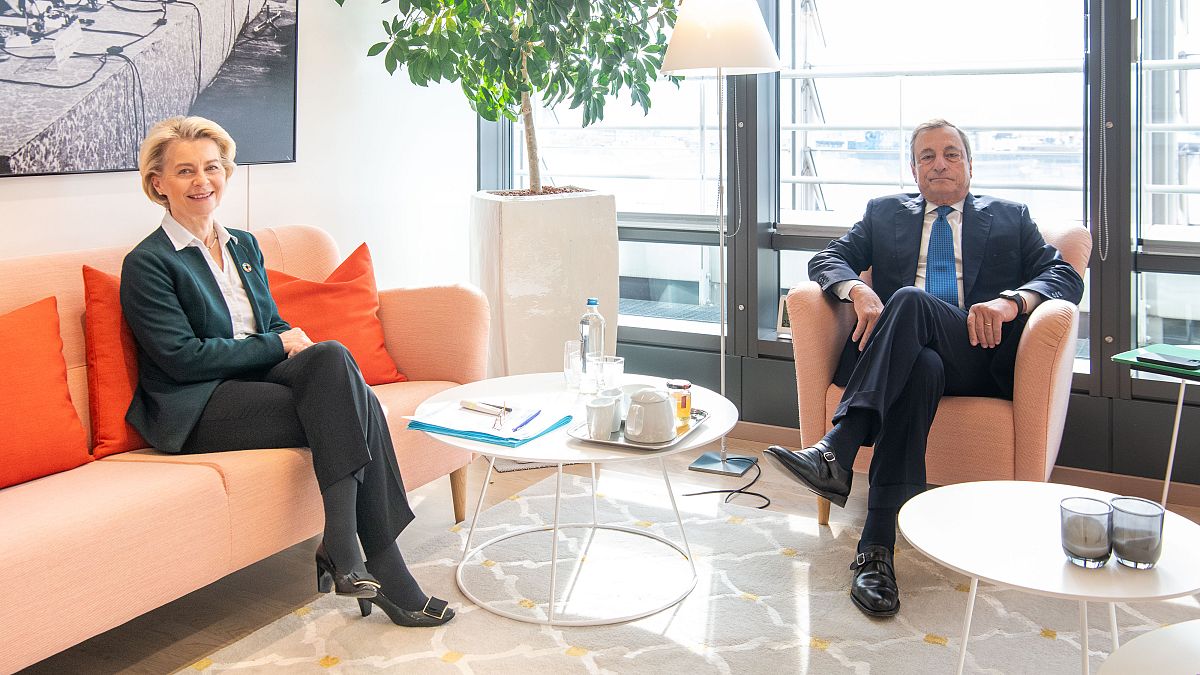Italy’s Draghi edges von der Leyen in poll on next Commission chief

The former Italian premier pips the incumbent European Commission President Ursula von der Leyen in a poll on who is more suited to take the helm of the next EU executive.
The contest for the top job in the next EU Commission has been painted as a two-horse race between current Commission chief von der Leyen and EU Italian stallion – or former European Central Bank chief – Mario Draghi.
Almost half of the respondents in a new poll considered both good picks to lead the next College of Commissioners, but placed the German slightly behind (47%) the Italian (49%) in the hearts and minds of Europeans.
Similarly, although one-third (33%) of those surveyed did not favour Draghi for the post – antipathy levels rose to 37% for von der Leyen.
The survey, conducted by market and social research firm Polling Europe in the last week of May, is based on over 5,000 complete interviews distributed proportionally to the population of the 27 EU countries.
Respondents were polled on their thoughts on Commissioners Nicolas Schmit and Thierry Breton in addition to von der Leyen and Draghi, though the former pair polled 37% and 39% respectively.
Draghi’s bid for the Commission is at the moment purely theoretical while von der Leyen is actively running as the lead candidate for the centre-right European People’s Party (EPP), expected to win the largest number of seats in the European Parliament after the elections.
Von der Leyen fared better among respondents from the countries of central eastern (53%) and northern (54%) Europe, with a good reception in Spain (56%) – despite socialists controlling the government there, the EPP’s main opponent at this election.
Von der Leyen failed to glean more than half (45%) approval rates in her native Germany, though she nudges Draghi, who polled at 41% there. The preference for the current Commission chief sank to 29% among French, who preferred homegrown champion Thierry Breton (40%).
Support for Draghi came from southern Europe (59%), boosted by strong approval in his native Italy (68%).
Geographical and political balance are important factors in determining the EU top jobs package after the elections: reselection of von der Leyen as Commission chief could be mitigated by the appointment as European Council president of a socialist coming from Europe’s south such as former Portugal’s prime minister Antonio Costa.
Support for the pair strongly divided the different European parties, according to the poll results.
Von der Leyen can rely on strong backing from those surveyed who will vote for traditional parties: Christian-democrats, socialists, and liberals (respectively, 70%,62%, and 58%).
Green voters seem to like her too (55%) despite the Greens not having backed her appointment in 2019. On the other hand, von der Leyen’s approval rating collapses at the extreme side of the hemicycle with the far right at 25% and the left at 38%.
If this support is confirmed at the polling station, von der Leyen would be the best choice.
Draghi appears to have slightly less support among the three traditional groups but more cross-party backing overall – his approval slips no lower than 40% across the piece – and a solid 55% approval from conservatives (55%), the group that is considered to tip the balance in the Parliament.
This suggests Draghi might be a preferable option if no clear majority arises after the election, and EU leaders prefer to appoint a less divisive figure.
Related
ForexLive European FX news wrap: Euro stays buoyed, markets wait…
Headlines:Markets:EUR leads, AUD lags on the dayEuropean equities lower; S&P 500 futures up 0.1%US 10-year yields down 2.7 bps to 4.255%Gold up 0.4% to $2,9
European shares fall as tariff uncertainties weigh; US jobs data…
(Reuters) - European shares fell on Friday as frequent shifts in U.S. trade policy throughout the week resulted in risk aversion, while focus remained on th
US economy added 151,000 new jobs in February; Euro on…
US jobs report releasedNEWSFLASH: Hiring across the US economy picked up slightly at the start of Donald Trump’s second term in office.The US economy added 15












